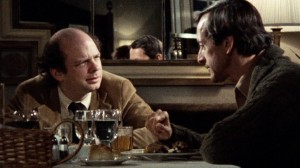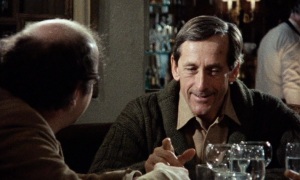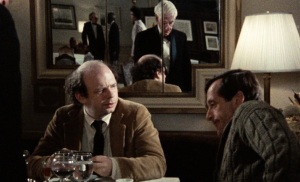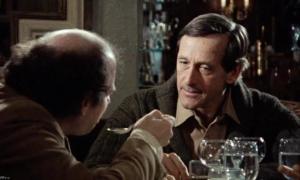 If, in last week’s post, I came across as a bit downhearted, this week I offer a pick-me-up.
If, in last week’s post, I came across as a bit downhearted, this week I offer a pick-me-up.
A couple of months into this project, a Spanish-speaking friend (let’s call him Andrés) generously offered to be my regular conversation partner, not as one half of an intercambio, but simply to give me the opportunity – which I only sporadically have – to experience sustained conversation in Spanish on a regular basis. Accordingly we have been meeting once a week in a local bar for upwards of 90 minutes, with no fixed agenda, and we just talk.
The experience is liberating. For some reason, the unwillingness to communicate that I wrote about last week simply evaporates and I achieve a degree of fluidity (I’m loathe to call it fluency just yet) that I’ve only ever experienced in dreams. The talk is wide-ranging and capricious, jumping from politics to psychology, by way of travel, literature, cinema, language, language learning and relationships. The 90 minutes flash by.
When I say we just talk, it’s not quite as unstructured as that. I talk; when I’m lost for words, Andrés intervenes. He takes notes and, at the end of the day, we review some of the problems I’ve had. The experience is not unlike the one that Edmund White recounts, in his autobiographical novel The Farewell Symphony, describing Lucrezia, his private teacher of Italian:
Her teaching method was clever. She invited me to gossip away in Italian as best I could, discussing what I would ordinarily discuss in English; when stumped for the next expression, I’d pause. She’d then provide the missing word. I’d write it down in a notebook I kept week after week. … Day after day I trekked to Lucrezia’s and she tore out the seams of my shoddy, ill-fitting Italian and found ways to tailor it to my needs and interests.
 Occasionally, I’ll ask Andrés if we can do the ‘Earl Stevick’ activity. That is the one that Stevick describes in Success with Foreign Languages (1989: 148):
Occasionally, I’ll ask Andrés if we can do the ‘Earl Stevick’ activity. That is the one that Stevick describes in Success with Foreign Languages (1989: 148):
Another of my favourite techniques is to tell something to a speaker of the language and have that person tell the same thing back to me in correct, natural form. I then tell the same thing again, bearing in mind the way in which I have just heard it. This cycle can repeat itself two or three times… An essential feature of this technique is that the text we are swapping back and forth originates with me, so that I control the content and do not have to worry about generating nonverbal images to match what is in someone else’s mind.
This technique is particularly effective when telling stories. For example, I told Andrés about a long exchange I’d had with the elderly woman who does my dry-cleaning, in which she passionately defended socialism. Having listened, Andrés told it back, in the first person, while I tried to catch the changes and improvements. Then I had another shot at it.
And all the time I keep asking myself: If I just did nothing else, could I learn any language this way? Is this all it takes: a table, two chairs, a ‘better other’, talk, reformulation, a note book, a glass of wine? Does it matter if the ‘better other’ is not trained, knows nothing much about pedagogical grammar, is simply a native-speaker who is good enough a listener to be able to work out what it is you’re trying to say, and can reformulate it for you?
 Well, when I compare these conversations with the intensive classes I took earlier this year, I have to admit that the undivided attention you get in the one-to-one situation, along with the exponential increase in talking time and the chance to choose the topics and control the direction of the talk, is a huge plus. On the other hand, I do remember valuing enormously the capacity of those (very experienced) classroom teachers to provide on the spot explanations of elusive grammar issues in response to learners’ errors, and this is perhaps the one ingredient that I would want to add to my conversations with Andrés. The one ingredient.
Well, when I compare these conversations with the intensive classes I took earlier this year, I have to admit that the undivided attention you get in the one-to-one situation, along with the exponential increase in talking time and the chance to choose the topics and control the direction of the talk, is a huge plus. On the other hand, I do remember valuing enormously the capacity of those (very experienced) classroom teachers to provide on the spot explanations of elusive grammar issues in response to learners’ errors, and this is perhaps the one ingredient that I would want to add to my conversations with Andrés. The one ingredient.
This is not to suggest for a moment that I am less than completely satisfied with my conversations. I know that I can go and look up the grammar stuff in my own time: I have my notes which act as a record of the difficulties I had. More important than the grammar stuff is the fact that the conversations with Andrés have endowed me with a capacity that I’ve rarely experienced in all my years speaking Spanish: the willingness to communicate (WTC).
Until recently, WTC has been construed primarily as an internal attribute of learners: something they have. However, as MacIntyre et al (2011: 93) argue, ‘perhaps it is time to widen the scope of the WTC concept to more explicitly take into account moment-to-moment dynamics within the social situation and the key role played by the communicative partner(s).’ Or, as Yashima (2012: 132) puts it: ‘WTC can only be enhanced and developed through the social processes and communicating with others. It takes two to tango.’ 
My experience with Andrés confirms that the willingness to communicate is much less an individual trait than a social one: not something you have but something you make. Something you make together. In fact, Andrés himself summed it up perfectly, quoting the Spanish writer Carmen Martín Gaite: La elocuencia no está en el que habla, sino en el que oye. (Eloquence is not in the one who speaks, but in the one who listens).
Andrés has given me my voice back.
References:
MacIntyre, P.D.,Burns, C., & Jessome, A. (2011) ‘Ambivalence about communicating in a second language: A qualitative study of French immersion students’ willingness to communicate,’ Modern Language Journal, 95, 81-96.
Stevick, E. (1989) Success with Foreign Languages, Hemel Hempstead: Prentice Hall.
White, E. (1997) The Farewell Symphony, London: Chatto & Windus.
Yashima, T. (2012) ‘Willingness to communicate: Momentary volition that results in L2 behaviour’, in Mercer, S., Ryan, S., & Williams, M. (eds) Psychology for Language Learning: Insights from Research, Theory and Practice, Houndmills: Palgrave Macmillan.
Stills from Louis Malle’s 1981 film, My Dinner with André, New Yorker Films (permission sought and pending).
